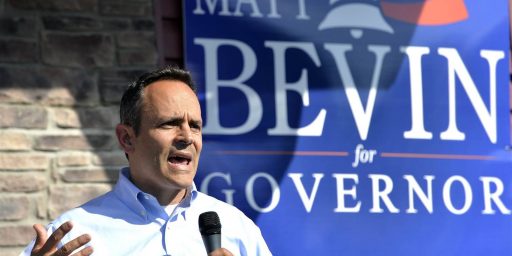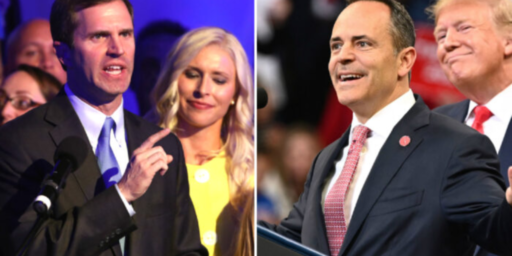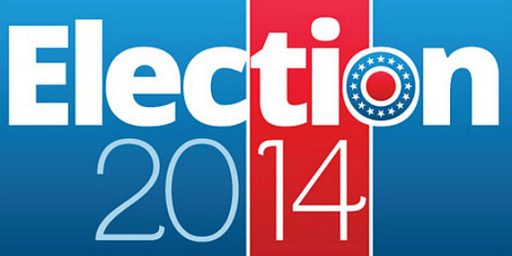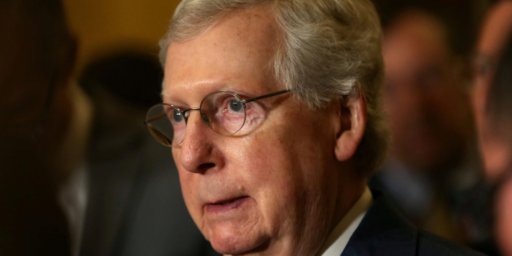Republican Candidates Behind In Key Senate Races
It's a bit too early for Republicans to be celebrating that Senate majority that so many people are predicting.
The big question surrounding the 2014 midterm elections, of course, will be whether or not Republicans will be able to take back control of the Senate after losing it in the 2006 elections and falling short in each of the past two election cycles. As things stand right now, the field looks very good for the GOP. They need a net pickup of at least six seats in order to get to the the 51 seats necessary to give them a majority, and there are seven states that Mitt Romney won in 2012 (six of which McCain won in 2008) with Democratic incumbents running or an open seat held by a retiring Democrat. Of those seven, it seems fairly certain that Republicans will win the three open seat races in Montana, South Dakota, and West Virginia, although none of these are certain obviously. Additionally, races in Michigan, Oregon, and New Hampshire look as though they might be more competitive in November than analysts firsts anticipated. On the downside, the GOP needs to worry about protecting seats in Kentucky and Georgia, both of which are potentially open to becoming Democratic pickups in the fall. Given all of that, the odds of the GOP picking up enough net wins to take the Senate back seems pretty high.
At the same time, though, it’s worth remembering that we are still more than six months left until Election Day, that there are primary challenges in GOP-held states that could lead to another O’Donnell/Angle/Akin situation, and that we have no idea what will happen between now and Election Day that could influence the debate. Apropos of those observations, a new poll from The New York Times shows Republican candidates in four key Southern Senate seemingly failing to breakthrough with voters:
Four Senate races in the South that will most likely determine control of Congress appear very close, with Republicans benefiting from more partisan intensity but a Democratic incumbent, seen as highly vulnerable, holding a surprising edge, according to a New York Times Upshot/Kaiser Family Foundation poll.
The survey underscores a favorable political environment over all for Republicans in Kentucky, North Carolina, Louisiana and Arkansas — states President Obama lost in 2012 and where his disapproval rating runs as high as 60 percent. But it also shows how circumstances in each state are keeping them in play for the Democrats a little more than six months before the midterm elections.
Senator Mark Pryor of Arkansas, a two-term incumbent who has been considered perhaps the most imperiled Democratic senator in the country, holds a 10-point lead over his Republican opponent, Representative Tom Cotton. Mr. Pryor, the son of a former senator, has an approval rating of 47 percent, with 38 percent of Arkansas voters disapproving of him.
Senator Kay Hagan, Democrat of North Carolina, appears more endangered as she seeks a second term. She has the support of 42 percent of voters, and Thom Tillis, the Republican state House speaker and front-runner for his party’s nomination, is at 40 percent. Unlike Mr. Pryor, however, Ms. Hagan’s approval rating, 44 percent, is the same as her disapproval number.
In Kentucky, Mitch McConnell, the Senate Republican leader, is also effectively tied with his Democratic rival, Alison Lundergan Grimes, a race that may be close because Mr. McConnell, first elected to the Senate in 1984, has the approval of only 40 percent of voters, while 52 percent disapprove. But Ms. Grimes must overcome Mr. Obama’s deep unpopularity in the state, where only 32 percent of voters approve of his performance.
With 42 percent support, Senator Mary L. Landrieu, Democrat of Louisiana, has an early lead in a race that is not fully formed against a large field of Republicans. Representative Bill Cassidy, the Republican front-runner, was the choice of 18 percent, and 20 percent had no opinion. There are two other Republicans in the race, but Louisiana has no primary. So all candidates of both parties will be on the ballot in November and, absent one of them taking 50 percent, there will be a runoff in December.
As Rod Dreher notes, there’s been some push back from Republicans over whether or not these poll numbers are an accurate reflection of the state of the race in each of these four states, and it is true that there are some issues regarding the sampling in the poll that make one wonder if we might be dealing with outliers here. At the same time, though, the other polling in these four races is largely consistent with the polls that the Times conducted. RealClearPolitics shows that North Carolina, Kentucky, and Arkansas are all basically dead heats, while Mary Landrieu continues to perform surprisingly strongly in the polling in Louisiana. In other words, the allegations that some on the right have made that these polls are somehow “skewed” is belied by the fact that they are largely consistent with all of the other polling that has been done in this race to date.
Dreher speculates on why Republicans might be underperforming in races that, at least on paper, one thinks they should be able to win:
Now one would expect significantly better results for Republican candidates in a midterm, given turnout differences and second-term fatigue and all the rest. I expect better results. But still: This kind of pattern is consistent with a deeper reality, which is that the G.O.P. is still a weak party with a weak message, and weak parties with weak messages have a way of underperforming the fundamentals, struggling in races that feature larger electorates and more persuadable voters (hence the Senate-House difference), and losing narrowly.
This, of course, is the same problem that the GOP had in the last two election cycles, but it goes far beyond the well known message, and messaging, problems that the GOP has suffered from since the later years of the Bush Administration.
In both 2010 and 2012 it seemed as though Republicans had a good shot of grabbing control of the Senate. While they came close in 2010, they fell short largely due to the fact that the primary process in states such as Delaware and Nevada resulted in the nomination of candidates that proved to be an embarrassment to the party. In 2012, the reasons behind the GOP’s failure were more complicated, but again candidate selection seemed to play a major role in failing to pick up a win in Missouri and actually losing a formerly Republican seat in Indiana. Additionally, the Republican Senate candidates in both Montana and North Dakota lost even though Mitt Romney won both states by double digits, an outcome which indicates that the candidates themselves were part of the problem.
Republicans face the possibility of a similar outcome in 2014. In Kentucky, for example, Mitch McConnnell at least remains competitive against Allison Grimes in polling, his Tea Party backed challenger Matt Bevin would most likely have a more difficult time in a General Election in no small part because he would not have access to McConnell’s campaign war chest. In North Carolina, the Republican primary next month remains something of a toss up and the possibility remains that North Carolina Republicans could end up nominating someone like Tea Party favorite, and Rand Paul endorsed, Greg Bannon who would likely be the Christine O’Donnell/Todd Akin of the 2016 cycle if he did get the nomination. Republicans are also battling it out for an open seat in Georgia and for the right to challenge Senator Mark Begich in Alaska and, in both cases, the nomination of the so-called “Tea Party” candidate could cause the GOP to lose a race that they ought to win. Finally, even in a state that will be won by a Republican such as Mississippi, there is Chris McDaniel’s challenge to Thad Cochran. The possibility of candidates like this causing problems for the GOP this year seems to be quite high.
With six months to go before Election Day, it is far too early to be writing any of these Senate races off, of course. However, the polling in these four states, along with news from elsewhere around the country, should stand as a warning to Republicans that they shouldn’t celebrate just yet.







Seems Obamacare isn’t the albatross you and your ODS think it is.
The same poling finds that Arkansas Gov. Mike Beebe and Kentucky Gov. Steve Beshear (D), who expanded Medicaid under the law, are hugely popular. Louisiana Gov. Bobby Jindal and North Carolina Gov. Pat McCrory…not so much.
But… but… all the Big Boy Talking Heads have been telling me the Repubs will actually take a _majority_ in the Senate, not _lose_ seats!
Mary Landrieu is ahead despite being in a red state because she’s running away from the hated Obamacare. And she. . . wait, what? She’s running on Obamacare? And she’s holding a lead?
This is the moment in the battle when the other side has worn itself out, when the soldiers are busy looting bodies and celebrating a bit too early. Now is when you counterattack.
@ C. Calvin
Jindal is still running ahead of fungus…
Something else to consider beyond Dreher’s analysis is that, due to it’s minority status and the demographic/cultural shifts, Republicans are also having a hard time keeping their coalition together and moving in the same direction.
This cause huge primary problems. For example, a fragmented coalition sets up the possibility of 3rd tier candidates end up winning because the top two candidates end up canceling each other out (how we got Todd Akin). And, even in cases where the front runner wins, their need to stay true to the different special “anti-” interests (anti-abortion, anti-immigration reform, …) ends up requiring them to take “severe” positions in the primary that hurt them in the general.
I think there are a couple of fundamentals working against the Republicans here too. One is that the economy is slowly getting better. The strenghtening economy its going to help both Obama and the Democrats.
Another is the ACA. The Republicans bet big on “Obamacare” being a disaster. Their message was going to be “Vote in a Republican majority so we can repeal this monstrosity.”
What they never planned for was that Oamacare being a big success. At this point, the numbers (8M exchange enrollees, millions more in Medicaid, and the likelihood of falling costs) look pretty good. If things go on as they have been, Obamacare is actually going to look like an advantage for the Democrats. Indeed, it might be the diference in KY. Can Mitch Mc Connell really run on repealing heath care for hundreds of thousands of Kentuckians?
Ellsewhere, Medicaid expansion is not only popular everywhere it’s been tried, but it is increasingly obvious that there is just no good reason for states turning down Medicaid, other than pure spite. Ladriuex intends to make Medicaid expansion the centerpeice of her campaign strategy, and Its already helped Pryor in Arkansas.
IMO, absent some unforeseen disaster, things are only going to get better for the Democrats over the next six months. I’m calling it now: the Democrats defend their majority in November.
@michael reynolds:
The next hammer comes when they find out what happens to gun violence in Georgia now that you can take a gun everywhere. Guns in bars? What could go wrong?
http://www.usatoday.com/story/news/nation/2014/04/23/georgia-gun-law/8046315/
The Republicanist ideology is not just flawed…it’s wrong…on every single issue. And as time goes by the flaws will inevitably get laid bare. Whether it is civil rights, trickle-down economics, WMD in Iraq, Obamacare, marriage equality, or gun control…eventually smart people will stop being stupid.
@stonetools:
Yeah…Doug too.
@stonetools:
The notorious Kristol memo on healthcare reform in 1994 doesn’t have any strategies once the reform takes place, and it didn’t envision what is essentially a conservative healthcare proposal like the Obamacare private insurance exchanges becoming law. The Kristol of ’94 would’ve loved Obamacare, but the party has moved rightward enough that all they had left was the tactic of total opposition. They’ve moved so far right that they no longer possess intelligent remedies to the problems of healthcare.
The strategy wasn’t always a “last stand” kind of bout against reform, but the times changed and they didn’t keep up.
@C. Clavin:
It is a complete ideological meltdown. There is no part of modern conservatism or libertarianism that is not now demonstrably irrelevant. The parts of the country that still cling to this discredited ideology are the parts of the country still living in the 19th century.
However, I wish Democrats would get ahead of the game for once and recognize that just as the GOP’s 19th century thinking is out of date, the Democrats’ 20th century thinking is running out of steam, too. It’s not 1860, but it’s not 1932, either.
We have now officially run out of minorities to defend. Now we’re just tapping out watches and waiting for the last morons to age out and die off. Civil Rights will cease to be a driver of Democratic ideology. We can coast on our righteousness for a while, but we need new ideas, new approaches, new things to be excited about. We need a pragmatic answer to economic equality, we need a new push on getting big money (even our big money) out of politics, we need a whole rethinking of education, and some kind of consensus on approaches to foreign policy and defense. What about trade? What about immigration? We do not have 21st century answers.
@michael reynolds:
I see that you got your subscription to SD’s newsletter.
@Matt Bernius:
I did and found it very interesting. Did you know we’re doomed to be a one-party state?
@michael reynolds:
You don’t say? that theory is ground-breaking in it’s originality.
@Tillman:
Fixed that up for you…
@michael reynolds:
I’m afraid that these ideologies are going to live on for a while. You live in California, but these ideologies are still potent in the South and the Midwest. These ideologies may be dead, but these zombies are going to be up and walking for a while-maybe decades. For now, the Republicans still have the power to block any attempt to move the country into the 21st century. We might have to wait for a while to have those debates you want us to have. I mean, for God’s sake, we’re debating voting rights for black people while the Japanese are building humanoid robots and the Chinese are building trains that go 300mph.
@Tillman:
“The Kristol of ’94 would’ve loved Obamacare”
I suspect not. I think Kristol of ’94 would have run away from Obamacare as soon as it had a chance of passage. Sort of like how the actual Republicans of ’94 acted with respect to their own proposals.
@michael reynolds:
Did it say what comes first? The one-party state or the white minority?
SD may be right, but not in the way he thinks. The “one-party” will be a few hundred people that have most of the money and property.
– Ron Suskind
Gee, maybe being out of touch with reality doesn’t work so well after all.
Michael- “It’s not 1860, but it’s not 1932, either”
How about reviving the space program and settling the planets? There’s a task that could keep the federal government occupied for the rest of the century. And Democrats could claim it as their issue, as being the heirs of JFK and “one giant leap for mankind.”
Some economic benefits: it’d put people back to work in long term jobs, it’d provide employment for all those STEM graduates the politicians keep claiming we need, it’d provide enormous scope for expansion of the economy as population and industry increase Out There.
It could capture the attention of the world in a good way. Consider this — would you rather live in a world focused on spreading humanity throughout the solar system, or one preoccupied by energy shortages, Chinese air pollution, and Russian adventures in Eastern Europe? Which is the world you want your kids and grandkids to live in?
Granted, it’s a bit late to take this tack in what’s left of the Obama administration. But there’s hope for HRC — she wanted to be an astronaut before settling for politics..
@michael reynolds:
Gay civil rights? Ending the drug war? Stopping foreign military adventurism? Reducing immigration restrictions?
@Moosebreath:
Can you cite something? My political memory doesn’t go back to when I was eight years old, and I’m incredibly lazy. Skimmed the Wikipedia article and it didn’t even mention Republican plans, only competing Democratic plans.
@michael reynolds:
You’re talking about American Brand Conservatism (Tm). In the rest of the world – for example the ruling parties of Canada, Germany, Norway, Sweden are conservative – conservatism is doing reasonably well.
Of course, Harper in Canada and Merkel in Germany are both well to the left of Obama and the Democrats on many issues, so the terms become plastic.
The difference is of course in most of the world conservatism is actually a philosophy, not a collection of bat sh*t crazy beliefs.
@stonetools:
Admittedly building 300mph trains is a lot easier when they’re allowed to periodicially derail and the government will completely censor any presss coverage of the resulting accidents.
I,m surprised to see Oregon on this list, I don’t see any possibility of a Republican winning a state wide race in this state even if she is an attractive neurosurgeon.
@michael reynolds:
I don´t think so. I have MANY Black Friends, and I think that the treatment that many American Blacks receive is simply horrible and indefensible. Race is also a matter of social class, and the United States is a horrible place to be poor.
@Tillman:
“Can you cite something?”
Here’s a good summary. From the final paragraph:
“At any rate, all Republican bills were left for dead by the end of 1994. Various forces (including Bill Kristol’s infamous memo) convinced the party that any compromise on health care reform would be good for President Clinton and thus bad for them. Colorado senator Hank Brown went so far as to rescind his co-sponsorship of the Chafee bill a month before the midterm election. The problem wasn’t the individual mandate, itself, but its incompatibility with the new message: there wasn’t a health care crisis in America to begin with.”
@Andre Kenji:
Yeah, but that’s individual behavior, not a matter of law. We can’t build a party on the idea of getting people to stop being aszholes. That’s too big a job.
@michael reynolds: I don´t think so. The United States has a risible social safety net, and THAT affects minorities. There is also the issue of mass incarceration of mostly Black males.
American conservatism has morphed into a bizarro version of the Gong Show. Not crazy enough? The gong sounds and you don’t get to play anymore.
What most pundits refuse to admit is that President Obama would probably be better off if the Republicans won control of the Senate for his last two years in office. Then the Obama Administration could make deals with the Republicans in Congress unlike the issue of having the House and Senate split between the two parties.
If the Repubicans controlled the Senate, then Congress could probably finally pass a budget and have President Obama sign it for the first time in his tenure. Also, if the Republicans control both houses, then the Obama Administration could probably convince the Republicans to make the stupid mistake of passing comprehensive immigration reform. It would also given President Obama to veto stupid legislation that the Republicans would pass and create more issues for the 2016 presidential election.
Having Congress split between the two parties just means two more years of stalemate and waiting for the 2016 election when the Democrats will pick up several seats in the Senate and challenge the Republicans in the House.
@michael reynolds: “There is no part of modern conservatism or libertarianism that is not now demonstrably irrelevant.”
Conservatism is affinity for the status quo. Ergo, the typical Democratic voters and officeholders are the conservatives of today’s America. Most of today’s Republicans aren’t conservative, but rather radical reactionaries who seek to turn the clock back to the 1950s if not earlier.
@superdestroyer:
It’s always been the case that Republicans are willing to make deals with Obama if Obama willd do exactly as Republicans want. For example, if Obama proposed to repeal ACA I suspect Republicans would probably sign off on that deal.
@superdestroyer:
Yes…it’s quite likely that Obama would sign the Paul Ryan budget which eviscerates help for the poor and the sick and elderly in order to cut historically low taxes on the rich even more. I’m pretty sure Obama dreams of that at night.
I think this one is gonna be really, really close. It’s so close that exactly which candidates are chosen and how campaigns are run will probably make a real difference, which isn’t always the case.
As always, Democrats will need to try and get their voters to the polls. Always a struggle in mid-term elections. I expect to see more base-service (or at least the appearance of such) in the future. They’ve recently rolled out proposals like minimum wage increases, bills aimed at equal pay, etc. They need to, because however true it is to say “OMG, don’t elect Republicans, they’re awful!” it’s not enough to get Dem voters to the polls in sufficient numbers. Also, too: vigorous defense of the ACA > timidity.
Republicans need to avoid more Akins moments. It’s not at all clear they can do that. And if they do manage it, will it lessen their advantage in voter ferver (if they fail to stroke the base properly, will the base not turn out as usual?)?
@Andre Kenji:
Just to clairfy things, according to the U. S. Department of Justice about 39% of the total prison and jail population are black. That means that although black are incarcerated disproportionately to their numbers in the overall population, they’re still a minority of the prison population.
@Sejanus: I’ve been reading Corey Robin The Reactionary Mind. He argues that conservatism is not really about protecting the status quo, but about reacting against a threat. The threat is that the wrong people might somehow claim to be your equals. The money quote is from Burke, “The occupation of a hair-dresser, or of a working tallow chandler , cannot be an honour to any person – to say nothing of a number of other more servile employments. Such descriptions of men ought not to suffer oppression from the state; but the state suffers oppression, if such as they, either individually or collectively, are permitted to rule.”
I’d always been puzzled that conservatives so eagerly support a hierarchy, when they themselves won’t be anywhere near the top. What Robin explains is that the important thing is not those above you – but that there be someone below you. They’re OK with living in a packing crate cooking a pigeon over an open fire on a curtain rod spit, as long as the black guy in the crate down the road doesn’t have a curtain rod.(1)
You’re quite right, they are reactionary, not conservative; and quite radical. And yes, Dems are the conservatives. Obamacare is certainly cautious and incremental change.
(1) I wish I remembered who to credit for that line. Anybody?
@C. Clavin:
Now that’s pretty damned cynical …
I think it was nice of Doug to post this – I’m sure he suspected the comments would contain critiques of Conservatism and Libertarianism.
@al-Ameda:
I’m not convinced. A substantial part of the caucus would object just because it was his idea.
@gVOR08:
Quite possibly true in America, and maybe that’s what sets apart the conservatives in the US from those in the rest of the world. Again, most of the world’s conservatives are well to the left of the Democrats in the US on most issues – for instance, in just about every country in the world but America, conservatives are for having a public health option (the argument is only whether it should be a mixture of public/private or pure public).
In most places, the underlying feeling of conservatives seems to be along the lines of “don’t rock the boat”. Which explains why quite often poorer people in those countries are conservative – they’ve a sense that things have been worse, and could get worse again. Its a feeling that ‘good enough’ is preferable to a risky attempt at ‘even better’. Which, again, explains why most of the world’s conservatives think having a public health option is a good thing – it keeps the boat from rocking.
American conservatives are, in fact, often the ones trying to rock the boat (to turn it around and send it backwards in time) – they’re a very unusual bunch, and as others have argued, the tag ‘conservative’ doesn’t apply to them at all.
Conservative radical is an oxymoron. Today’s Republican base are not conservatives. They are radicals. How many amendments to the Constitution do they oppose these days? They don’t want to preserve the union or the Constitution. They want to tear them to pieces.
@Dave Schuler: Dave, we incarcerate a higher percentage of our black population than South Africa did at the height of apartheid.*** And the ones that aren’t in prison? They are on probation/parole.
*** (forget where I read that so no linky, but they cited #s and sources)
@gVOR08:
Are you seriously suggesting that only conservatives are hierarchical? The human desire to organize into dominance hierarchies is pretty much universal, a result of having evolved from apes.